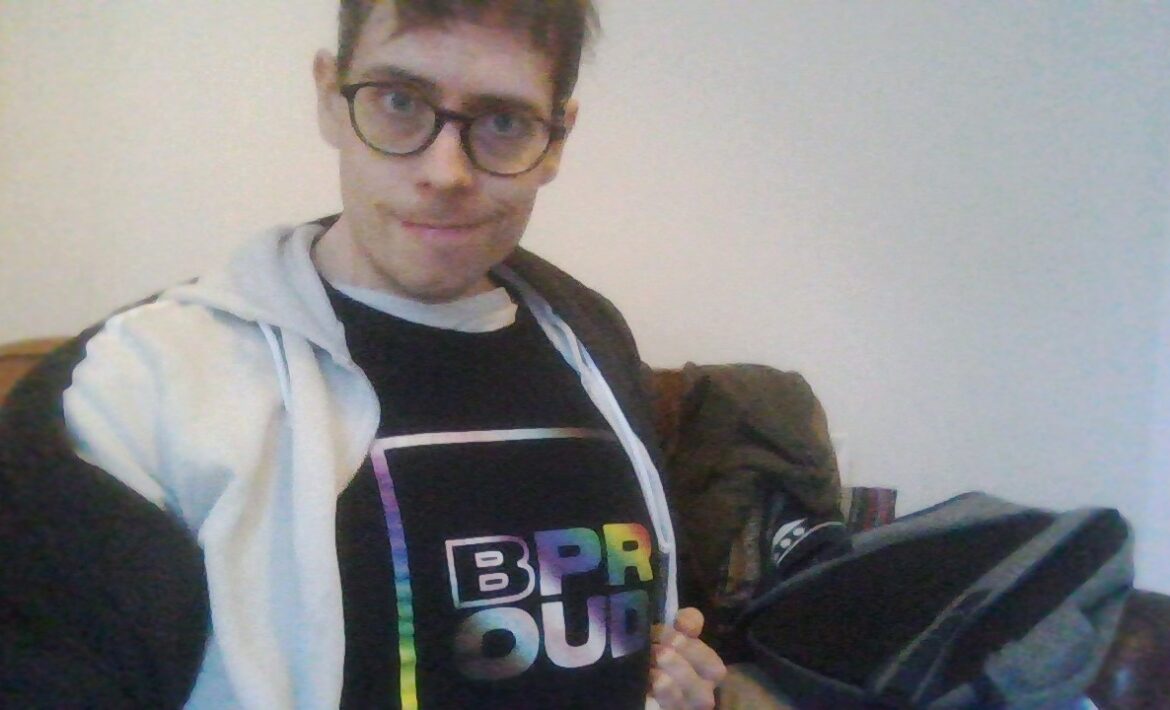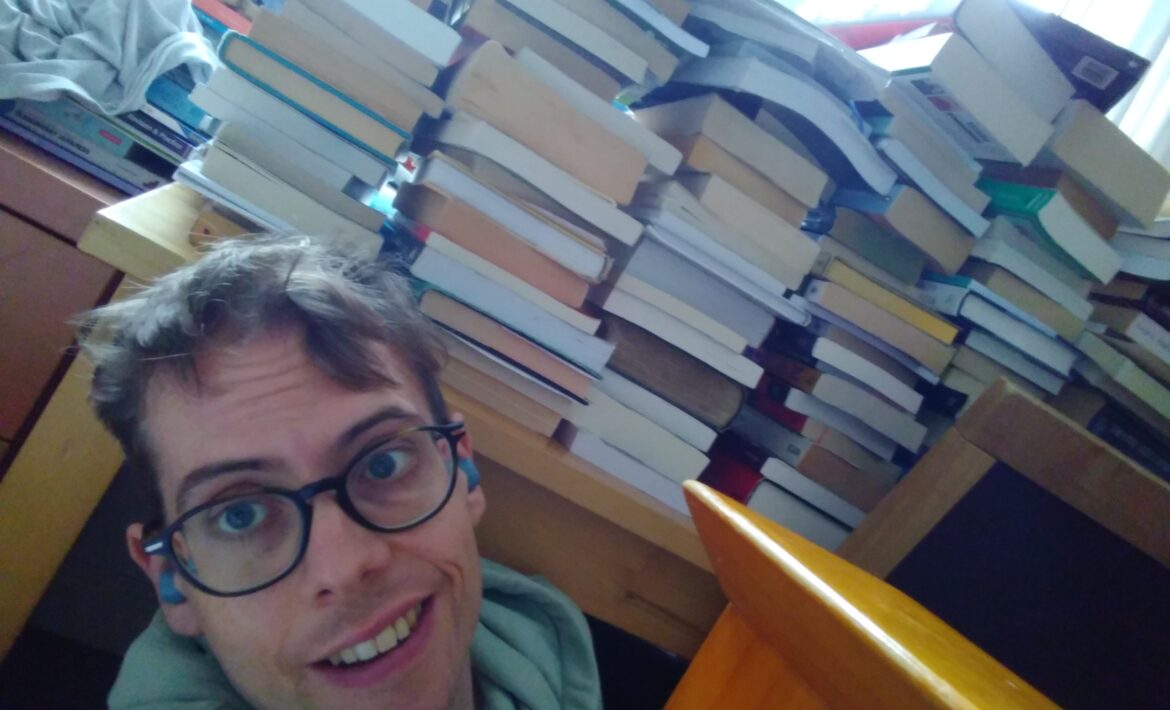
Monday 5th July 2021: On Speaking (and on when I can’t) + Videos!
EDITED: Please find the videos for the Q&A with Jerry Rothwell in the middle of the blog.
Hi everyone,
Hope you’re doing alright. I’ve been busy this week, mostly recuperating from last Sunday’s performance. As I said in the blog two weeks ago, I was invited to a Q&A with Jerry Rothwell, the director of the film version of The Reason I Jump. Well, Sunday 27th June was the night. I wore a suit and everything.
As the people there were able to tell you, we were both pretty good. It was a lovely combination of a stand-up gig, a podcast, an interview, a university lecture and the autism experience group. Please find the videos below:
The film ‘The Reason I Jump‘ is about five non-speaking autistics in different parts of the world; Amrit, Ben, Emma, Jestina and Joss. It’s based on Naoki Higashida’s book The Reason I Jump, which he wrote when he was twelve. The book was written by Higashida using a letter board and computer. Japanese hiragana and katakana are written phonetically where one symbol equates to one sound or combination of sounds. This means that Higashida will be able to express his thoughts without having to consider the complex spelling rules of English, for example.
Reading the book now, well, it shows its age. It was translated by K.A. Yoshida and David Mitchell, who many know from the Booker Prize-nominated Cloud Atlas. The language is consistently person-first, due to Mitchell’s position as a parent of an autistic child with few or no words, translating this in the early-to-mid 2000s. Worse, despite its loud advocacy for letter boards and empowering forms of communication, the English wikipedia page still claims Higashida didn’t write it (in fact, he’s been a writer and autistic activist ever since its original publication Japanese, even performing at Q&As for the film’s Japanese premiere). Higashida did, but a long time ago. He still writes, mainly poetry, which you can read on his blog, right here (site in Japanese): https://naoki-higashida.jp/blog/
I Speak Because I Can
For years, the point of speaking has been a wedge pushed into the autistic community, separating us from one another. This is due to the history of the diagnostic criterion. According to Kanner, who wrote about autism in the 1940s, to be autistic was to live “without the social instinct to orient towards other people, who were mostly focused or even obsessed with objects, and who had a “need for sameness” or a “resistance to (unexpected) change”.”* At some point, this idea of ‘classic autism’ rolled into being totally non-verbal and uncommunicative, particularly after the work done in Britain by Judith Gould and Lorna Wing, on what they were forced to term ‘asperger’s syndrome’ due to funders expecting them to define a new diagnostic criterion.
As I said in the Q&A, over the past few hundred years in what we laughably call ‘the West’, there has been a cultural and philosophical interest in what it means for someone to be a shell of a person with nothing inside, a nearly-human. Something closer to a plant or a stone, in Heidegger’s understanding. This pre-dates Mary Shelley’s Frankenstein, Caspar Hauser’s life and the shell-shocked World War I veterans who were the subject of much discussion in the 1920s and 30s. The trope is still here: in robots and androids, in zombies, machines, text-to-speech computers and automatons. Until recently, homosexuals, people of colour and disabled people were uncanny nearly-humans in wider culture. Trans and non-binary people are still seen as such. So are autistics.
In Freud’s The ‘Uncanny’ (1919), he defines the ‘uncanny’ as an emotional response to concepts that create a sense of unease due to the object or person perceived being out of joint with what they are supposed to be. Identical twins are uncanny, because they look so alike they can be confused with the other – this breaks the definition of a person being totally unique in every way. Animals are uncanny, especially apes, since they are similar in behaviour to human beings despite being also fundamentally different. Automatons are uncanny, so are doublings, body parts that are not connected to their bodies and non-human objects that seem human.
To be autistic is to be uncanny, on two levels. First off, autistic people are widely seen as automatons, creatures that have human bodies but are void of the essential humanity that is defined by those who do have it. Second, to be autistic oneself is to live in a world where one is seen as not-fully-human, while definitely being so.
The writer Joanne Limburg writes about her autism diagnosis and her experience of the uncanny state of being an autistic human here: https://www.theguardian.com/society/2019/jul/16/i-knew-people-found-me-uncanny-and-strange-then-came-the-diagnosis-that-explained-it-all
At some point, speech became that wedge issue. If you could not communicate in ways that were understandable to other human beings, there wasn’t much there to begin with. This is not dissimilar to earlier treatments of neurotypical mute and deaf-mute people, who have physical disabilities that impede them from communicating in the spoken word. I’ve spoken before of the 1880 Milan conference that forbade sign language in schools for deaf pupils. Despite their stated intention to not exclude deaf children from hearing society, the outcome was the opposite; deaf people were marginalised to an even greater degree.
However, deaf and non-speaking neurotypicals are still neurotypical. They have a shared sense of intuition and non-verbal communication in common with speaking neurotypicals. They can make themselves understood more easily than autistics with few or no words and, despite them seeming to share a fundamental “lack” they share in the eyes of society; the dehumanisation that (temporarily) non-speaking autistic people experience seems different to me. Colder somehow. Not just are they talked over and patronised, they are reduced objects that need to be ignored or destroyed. It requires a further turning off of the heart and empathy for a fellow NT to do that to deaf and non-speaking neurotypicals. Please correct me if I’m wrong, though.
Now, if you’re a deaf autistic, I imagine times when you’re not able to speak (using sign, writing, AAC and/or Makaton) would make things even more complicated – I’d love to hear from any deaf autistic with few or no words, if it is.
On Wednesday, I didn’t sleep well at all. I woke up before 7 and couldn’t get back to sleep. I still had a dull ache in my lower back that was caused by an injury I sustained while exercising a week previous. I felt miserable all day, on top of a tired day the day before. I ate too much and felt awful about it. In the early afternoon, I had a meeting with my Stonewall contact, then a lesson. I was totally exhausted, but didn’t realise that I had crossed a line somewhere.
After a meltdown that crept up on me, I had to stop speaking. It was like there was a boulder in my lungs. Paraphrasing Virginia Woolf, I couldn’t form sounds. If I wanted to exist, I needed to avoid spoken language. I don’t remember doing this a lot as a child, but I must have. I also ate compulsively to keep energy in my body and not crash, both when I was a child and on Wednesday and Tuesday.
Instead, I stayed in bed and played Hades on my Switch, under a weighted blanket. When my partner came upstairs to say hello, he had to get what I meant from my signing and mouthing words. Unfortunately, since he’s terrible at reading body language, that took a few goes. But I was able to use my face and body to express what I needed and a heart shaped with four fingers is clear to even him. He made me dinner and we had a hug. The next day I was actually able to speak again, haltingly at first, but fluently after a while. I needed a mental health day. Thank god for being self-employed, because I could actually do that now. For me, self-employment is far superior to having a job with other humans, since I don’t have to pay attention to faff surrounding social expectations and potential disappointment.
This experience was an important reminder to me that I sometimes DON’T have speaking privilege and that we as autistics fall along a spectrum of speech-capacity that is impacted by stress and conditions out of our control. If you’re autistic and can’t use the spoken word, then that doesn’t mean you are mindless. If someone like me, who overtalks usually and was classed as therefore classed as “high-functioning” (cough, cough) can be temporarily “non-verbal”, that is an indication that the entire functioning-labels “debate” is bullshit. We are all autistic, whether or not we have learning disabilities, whether or not we have physical and motor disabilities, whether or not we’re having a good or a bad day. End functioning labels, end Autism Speaks, end conversion therapy. We are speaking loud and clear, even if we do so without words.
More Things
I have the video of the Q&A, which I will make public only when I get the say-so from Jerry. When I do, I’ll link it here.
Next week will be the calm before the storm, as I have a meeting with my mentor, then a bananas-busy week with my induction week for EAP teaching all summer and a panel for a financial services company, as well as teaching my regular tutees. The week after that is my first proper week teaching. Things won’t settle down until the week of the 26th of July, where I’ll hopefully get into a more regular schedule. After August 27th, we’ll hopefully be able to move to Bath and I’ll be back on the ball. I might need to give this blog a brief hiatus for the Summer, at least for the first few weeks of the EAP programme. I’ll keep you posted, though. A lot of interesting stuff will be happening from September, which I look forward to sharing with you when the time comes.
The Autistica Research Festival is happening once again this year, from the 12th to the 16th of July. Please book your (free) tickets here: https://www.autistica.org.uk/get-involved/research-conference/research-festival-2021-programme
I also have had the mother of all book hauls from my favourite bookshop on the planet, Gay’s the Word. Please support independent bookshops. I certainly have.
For more on the bookhaul, see my Instagram feed. https://www.instagram.com/jorik_mol
Lastly, I will be at Harry Wright’s preview performance of ‘Smalltown Boy’ on Saturday July 10th for a 7:45 start. Yes, in front of a human audience. We’ll be at Bistro Walluc in fancy Shoreditch, London.
40 Redchurch Street, London, GB E2 7DP
If you want to join us, please text Bistro Walluc to book. And yes, they have vegan fondue, which is what I’ll be having. The number is: 07864 219 140. See their instagram page: https://www.instagram.com/bistrotwalluc/
And one for the (non-) spoken word users among us (particularly Christopher, who filmed the Q&A last week):
See you next week!


